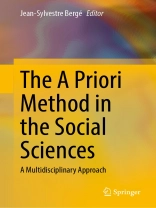This edited volume takes a multidisciplinary look at the philosophical concept of a priori. Placing social sciences at the heart of the discussion, this book establishes a dialogue between various disciplines and the different postulates, presuppositions, prejudices, paradigms, beliefs, commonplaces, biases or emotions that forge their theoretical and practical constructs.
The book is divided into three parts. Chapters in Part I lay the foundations of a new antecedent approach that revisits the classical approach to a priori and its relationships with law and philosophy. Chapters in Part II extend the analysis to economics and management, on such key topics as blockchain technology, labor, health insurance and innovation. Finally, chapters in Part III turn to anthropology and sociology, to reconsider the core methods of these different disciplines and to nourish reflection on the basis of new working hypotheses.
Table of Content
Part I: Law, Philosophy.- 1. Towards a New Antecedent Legal Method.- 2. The Cultural Dimension of Law.- 3. Is Legal Knowledge a Knowledge of Object?- 4. Antecedent and Ontology: in Search of the Smallest Possible A Priori.- 5. The Private/Public Divide among the Principles of Worldbuilding: Insights from Godelier, Fortes, and Arendt.- 6. The A priori: a Structure of an Ascendant Imaginary.- 7. Are Numbers A Priori Like any Other?- Part II: Economics, Management.- 8. Antecedents in Labor Economics.- 9. Blockchain: Antecedents and Future Challenges.- 10. A Priori to Investigate Innovation in Management Science.- Part III: Anthropology, Sociology.- 11. Not Having an A Priori
has Become the Anthropological A Priori: Multiple Forms of Knowledge are Produced in Ethnographic Experiments.- 12. The Investigation as an Antecedent in Sociology and other A Priori
About the author
Jean-Sylvestre Bergé (Ed.) is a Full Professor of Law at Université Côte d’Azur CNRS GREDEG, Honorary Member of the Institut Universitaire de France. Since the beginning of his career, he has developed the following research themes: international and European intellectual property law, the Europeanization of law, interactions between international and European law, methods of application of law in a global context, and an epistemological approach to circulation phenomena. His new research theme focuses on the antecedent approach to law.












